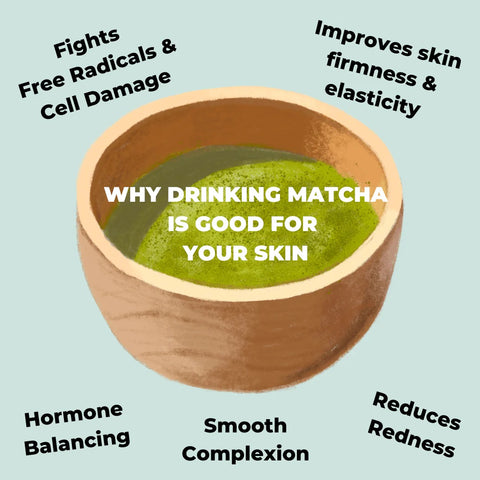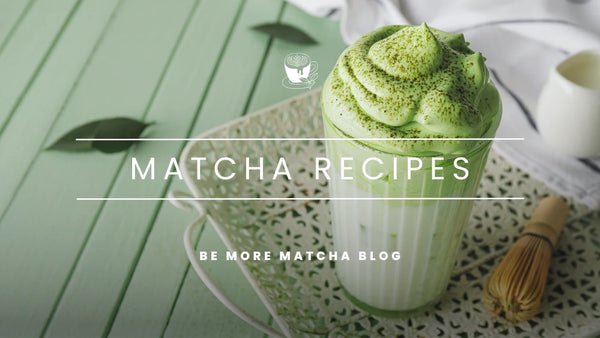Matcha has been weaving its way into the fabric of health and wellness trends with an unmatched fervor. Esteemed for its vibrant hue and myriad health benefits, matcha goes beyond being a staple in traditional Japanese tea ceremonies to becoming a global superfood.
At the heart of matcha's health-promoting attributes are its potent antioxidants, which play a significant role in weight management and enhancing overall health. But how do these antioxidants work, and what role does matcha play in weight loss and health?
This guide delves into the intricate role of antioxidants found in matcha. Let's discover how this ancient beverage can contribute to a modern lifestyle marked by vitality and wellness.
Understanding Antioxidants
Antioxidants are the body's guardians. They protect our cells from damage caused by free radicals. These unstable molecules can harm cellular structures and contribute to chronic diseases.
The unique antioxidant profile of matcha sets it apart from other green teas. Catechins, especially Epigallocatechin Gallate (EGCG), are lauded for their health-promoting properties.

Source: cosmacon.de
These powerful antioxidants neutralize harmful free radicals and boast many health benefits contributing to disease prevention and overall wellness.
Matcha's rich concentration of EGCG and other catechins makes it an unparalleled source of antioxidants. It offers protection beyond the surface level to fortify the body's internal defenses.
Antioxidants in Matcha and Weight Loss
The journey to weight loss is multifaceted. Diet, exercise, and metabolism play crucial roles. With its high antioxidant content, matcha (particularly EGCG) offers a unique edge in this journey.
Studies have shown that EGCG can significantly increase thermogenesis (the body's rate of burning calories). Increases can be measured from a normal 8%-10% of daily energy expenditure to between 35% and 43%.

This enhanced calorie burning is pivotal in weight loss, as it helps to create a calorie deficit without the need for extensive lifestyle changes. Moreover, matcha's antioxidants can help regulate appetite and reduce food cravings by modulating the levels of hormones involved in hunger signaling.
The cumulative effect of increased fat burning and appetite control contributes to sustainable weight loss and weight management. Research further supports the role of matcha in improving physical endurance and efficiency in fat-burning during exercise. This makes matcha a valuable companion for anyone looking to lose weight and improve fitness levels.
Broader Health Benefits of Antioxidants in Matcha
The benefits of matcha extend far beyond weight loss, touching various aspects of health thanks to its antioxidant properties.
Cardiovascular Health:
The antioxidants in matcha help reduce harmful cholesterol levels and improve the ratio of good cholesterol, leading to reduced blood pressure and a lower risk of heart disease.
The anti-inflammatory effects of catechins also contribute to cardiovascular health by preventing arterial plaque formation.
Enhanced Brain Function:
Regular consumption of matcha has been linked to improved cognitive function, including better memory and attention.
The L-theanine and caffeine in matcha and its antioxidants work together to enhance brain performance and protect against neurodegenerative diseases.
Anticancer Properties:
EGCG and other catechins in matcha have been studied for their potential to inhibit cancer cell growth and promote the death of cancerous cells, particularly in cases of breast, prostate, and liver cancer.
While research is ongoing, the early findings are promising for matcha's role in cancer prevention.
Skin Health:
The antioxidant properties of matcha protect the skin from UV damage and improve skin elasticity, thereby preventing signs of aging such as wrinkles and sunspots.
Matcha's anti-inflammatory effects also help reduce acne and skin redness, promoting a healthy, glowing complexion.

Incorporating Matcha into Your Diet for Optimal Benefits
Adopting matcha into your daily regimen can be a delightful experience and a monumental step towards better health.
Here’s how you can seamlessly integrate this potent green tea powder into your diet:
Start with High-Quality Matcha:
Opt for ceremonial-grade matcha for drinking and culinary-grade for cooking and baking. The quality of matcha not only affects its health benefits but also its taste and color.
Explore Different Preparations:
Beyond the traditional hot tea, matcha can be used in lattes, smoothies, or even in your morning oatmeal. Its versatility also extends to baking, where it can add a healthful twist to cookies, cakes, and pancakes.
Looking for matcha recipes? Click here for our matcha recipes guide and ways to prepare your matcha.
Mindful Consumption:
For weight loss and health optimization, timing and quantity matter. Drinking matcha in the morning can boost your metabolism and energy levels throughout the day. Limiting yourself to 1-2 servings daily can help you reap the benefits without overdoing caffeine intake.
Pair with a Balanced Diet:
Matcha works best as part of a holistic approach to health. Combine your matcha ritual with a balanced diet of fruits, vegetables, whole grains, and lean proteins to amplify its benefits.
Stay Consistent:
Like any aspect of a healthy lifestyle, consistency is key. Make matcha a regular part of your routine so you can fully experience its weight loss and health-enhancing effects over time.
Conclusion
Matcha isn’t just a trendy superfood—it’s a centuries-old tradition that boasts an impressive array of health benefits thanks to its high antioxidant content.
From aiding in weight loss to improving heart health, cognitive function, and skin vitality, matcha presents a compelling case for being one of the most beneficial additions to a health-conscious lifestyle.
By incorporating matcha into your diet, you’re not just enjoying a delicious beverage but investing in a holistic approach to wellness that reverberates through every aspect of your life.
So, take the leap and let matcha be a vibrant, healthful, and energizing part of your daily routine. Your body (and taste buds) will thank you.
FAQ: Antioxidants in Matcha for Weight Loss and Overall Health
How does matcha help with weight loss?
Matcha aids in weight loss through its high concentration of antioxidants, particularly EGCG, which can increase thermogenesis (the body's rate of burning calories) and regulate appetite. This makes it easier to maintain a calorie deficit and manage weight effectively.
Can drinking matcha improve my skin health?
Yes, the antioxidants in matcha, especially catechins, protect the skin from UV damage, improve skin elasticity, and reduce signs of aging. Its anti-inflammatory properties also help reduce acne and skin redness, promoting a healthier complexion.
How much matcha should I consume daily for health benefits?
For most people, 1-2 servings of matcha per day are recommended to enjoy its health benefits without overconsumption of caffeine. Starting your day with matcha can boost your metabolism and energy levels.
Is matcha better than regular green tea?
Matcha contains a higher concentration of antioxidants, including EGCG, because it is made from whole tea leaves ground into powder, ensuring you ingest all the nutrients. While regular green tea also offers health benefits, matcha leads in terms of antioxidant content and health-promoting properties.
TL;DR: The Role of Antioxidants in Matcha for Weight Loss and Overall Health
- Matcha, a high-antioxidant green tea powder, offers significant health benefits, including weight loss, improved brain function, and enhanced skin health.
- Its rich content of antioxidants, especially EGCG, boosts metabolism, aids in fat burning, and has potential anticancer properties.
- Incorporating 1-2 servings of matcha daily can enhance cardiovascular health, reduce bad cholesterol, and improve cognitive abilities.
- Matcha is versatile and can be enjoyed in various forms, from traditional tea to smoothies and baked goods, making it easy to integrate into your diet.
- Choosing high-quality matcha and adjusting intake based on individual caffeine sensitivity is important for optimal health benefits.


